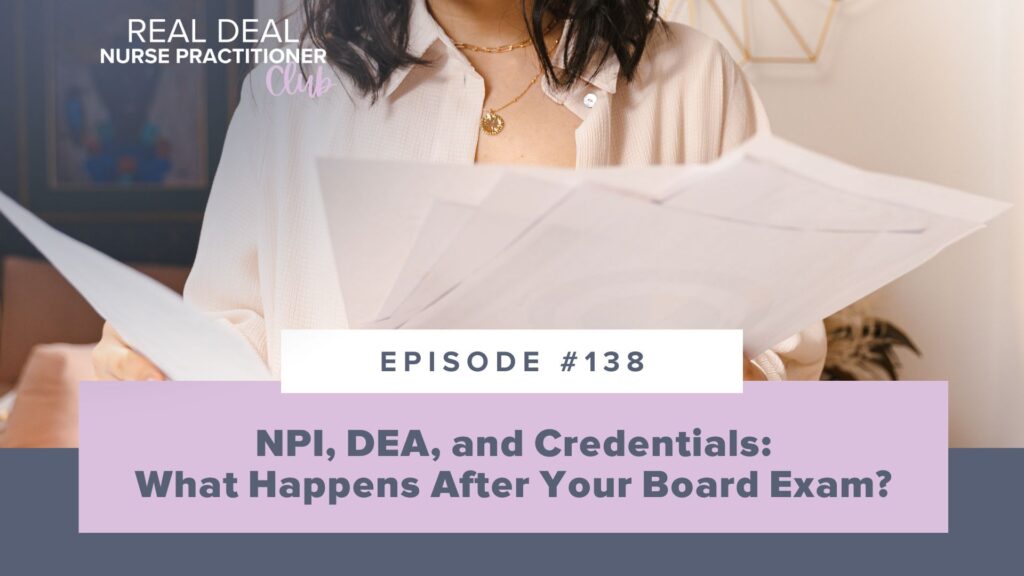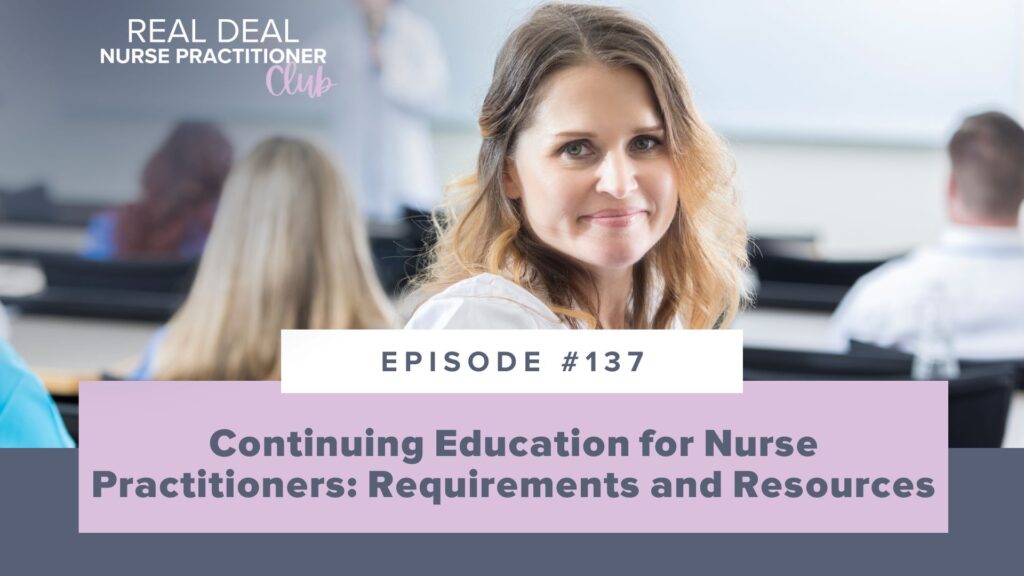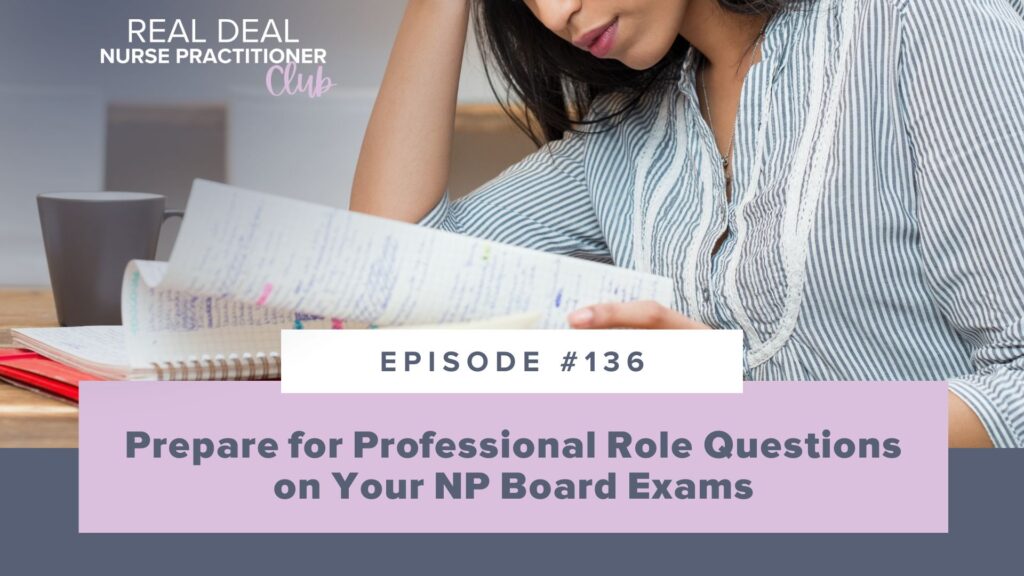Ep #133: Navigating the Challenges of Working in a Retail Clinic as a New NP with Kaitlyn D
- by Sarah Michelle
- Feb 19, 2025
- Podcasts
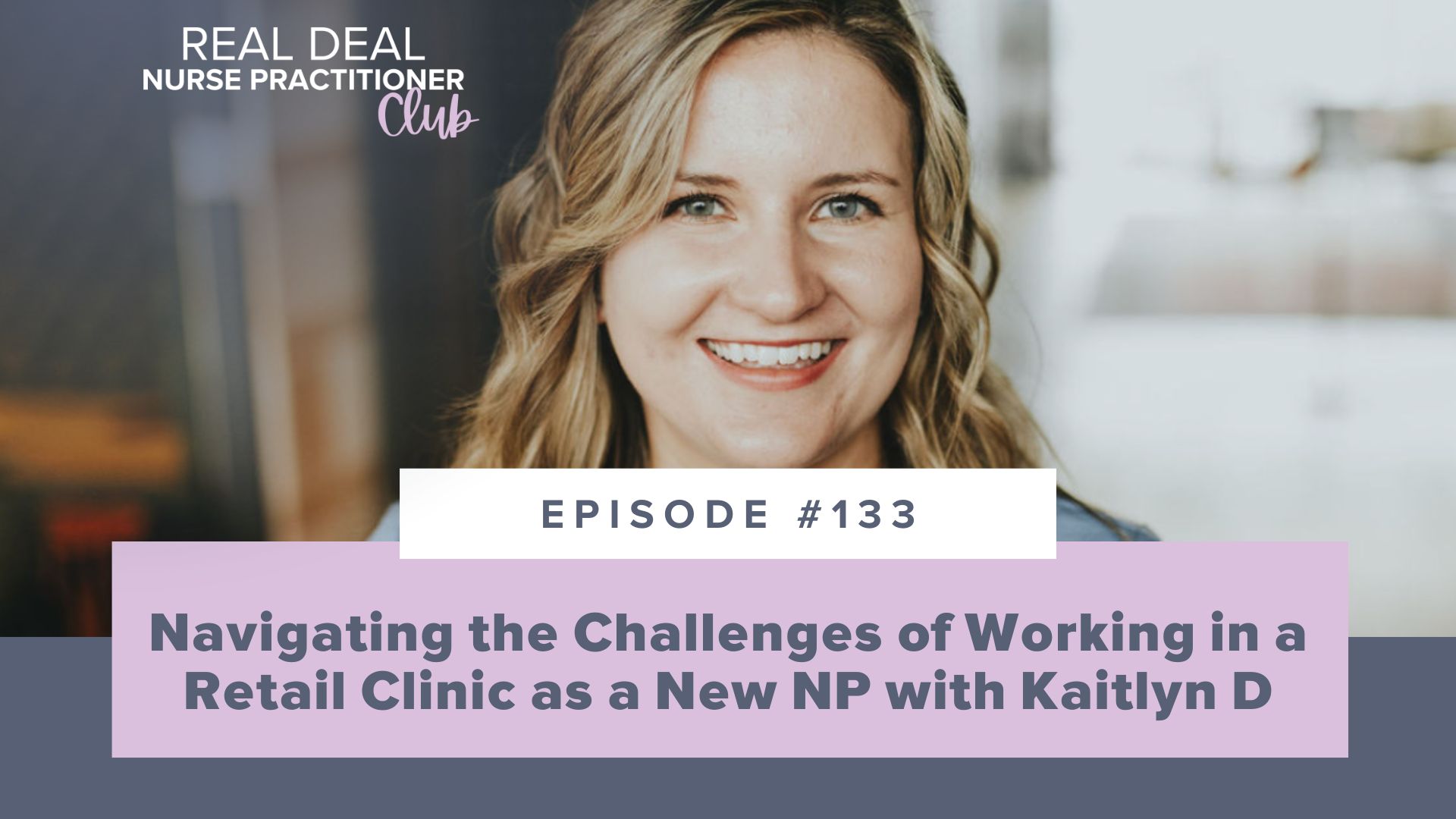
Have you ever wondered what it’s like to work as a nurse practitioner in a retail health clinic? In this episode, I sit down with my good friend and colleague Kaitlyn to discuss her unique experience as a new NP in this fast-paced setting.
Kaitlyn shares her journey from working in the ICU to transitioning into a retail health clinic, where she treated a wide variety of conditions and learned to navigate the challenges of working independently. She also reveals how this experience helped her develop essential skills like time management and physical assessment.
Tune in to discover the ins and outs of working in a retail health clinic, including the most common conditions treated, the benefits and challenges of this setting, and Kaitlyn’s top tips for success as a new NP. Whether you’re a new grad considering your options or an experienced NP looking to explore a different setting, this episode is packed with valuable insights and relatable stories.
What You Will Discover:
-
What a retail health clinic is and how it differs from other healthcare settings.
-
How working in a retail clinic can help new NPs develop confidence and essential skills like time management and physical assessment.
-
The benefits of working in a retail clinic, including flexible scheduling and minimal charting outside of work hours.
-
The challenges of working independently in a retail clinic and how to navigate them successfully.
-
The importance of utilizing resources, building a network of specialists, and being comfortable with looking things up as a new NP.
Featured on the Show
- Follow me on: Facebook | Instagram | YouTube | TikTok
- Follow us on TikTok and YouTube!
- Check out our Job Hunt Course!
Full Episode Transcript:
Welcome to the Real Deal NP Club. Whether you’re hoping to become a real deal nurse practitioner or you already are one, this is the place for you to get the resources you need as you tackle this massive transition into practice. We’re your hosts, Sarah Michelle, Chief Nursing Officer of Blueprint Test Prep, and Anna Miller, Director of Nursing Content. And we’re here to hang out with you each week like your best friends in the NP space. Let’s dive in.
Anna: Hello, hello everyone, it’s Anna here and welcome back. Happy February. I cannot believe we are already over a month into our new year. I have a really fun, cool, different type of episode today that I think you all will really like especially if you are graduating from NP school soon, you’re looking into different areas that maybe you could work. And even if you are already a practicing NP and you just wanna learn about a few different settings. And so with me today, I have my good friend, Kaitlyn.
She is one of our amazing team members here at SMNP Reviews. And she has a really cool experience as a new NP back when she was working in the clinic setting. But I am going to pass it to you, Kaitlyn, and do you just wanna kind of introduce yourself and give your background as an NP?
Kaitlyn: Yeah, thanks, Anna. I’m Kaitlyn, I’m a family nurse practitioner and am currently the FNP content lead here. And when I started NP school, I was working in the ICU and saw so many different serious conditions as you can imagine that, you know, could have been prevented. So I just kind of came really passionate about like the prevention side of things and which is why I kind of wanted to do this in the first place. So fast forward to graduation, I had a job lined up in primary care and the clinic was bought out by a corporation, so things didn’t work out, but I had a good friend that reached out to me like, hey, we have this great position, great flexibility.
And by this point, I had a one year old, you know, I was looking for something with more flexibility than like a normal, like 9 to 5 Monday through Friday job. So it was in a retail health clinic. And so I did that for a few years before I became full time with my current job. And if you don’t know what retail health is, they’re basically like those little small clinics that are usually located within a retail store. So think of like Kroger, CVS, Walgreens, and they’re just like essentially mini urgent cares staffed with like two people max, sometimes even one.
That’s not the standard.
Anna: I actually just went to a retail clinic this past week because we just moved and I still am setting up a new primary and I couldn’t get into my old primary that was an hour away and needed to go be seen. So they are definitely wonderful, wonderful things, but it was small. There’s only, there’s one NP and someone helping them basically check me in. And that was it.
Kaitlyn: So yeah, they are super convenient. And I mean, that was my experience working there. You know, people would come in and couldn’t get into their primary right away. And then even like, like, you know, the bigger urgent care centers that are around town they get really filled up too so it’s just like another option they’re super convenient if you have just like something minor going on like you have a cold you have flu covid all those types of things, that’s really the purpose of them.
Anna: Yeah, and they’re a nice break from like the ER or the urgent care setting where you’re in a waiting room with 20 other people who also have the flu or COVID or what.
Kaitlyn: Exactly. Yeah.
Anna: What would you say are some of the most common conditions that you saw in retail clinics?
Kaitlyn: Yeah, for sure. So like I mentioned, just minor acute conditions, so flu, strep throat, lots of rashes. Also, just like a lot of preventative care services, and this really kind of depends on the retail clinic. So for us, we pushed a lot of vaccines, did lots of blood pressure screenings, we did lots of cholesterol screenings, diabetes. I would occasionally see some chronic conditions.
So like you mentioned, like a lot of people would like move to the area and they haven’t established a new primary care yet. So like I really need my listener refilled. And so I would do as much as I can to do that in a safe way. But also like, you know, you need to go find a primary care doctor, a nurse practitioner to see. We also did a lot of physicals, so like sports physicals.
Sometimes my entire day would be sports physicals, just like that time of year. And then a lot of like DOT certification renewals. And so DOT is like Department of Transportation and these are like the certifications that truck drivers have to have. So lots of variety.
Anna: Yeah, that’s a huge variety, but that’s also a really cool experience as a new grad nurse practitioner because you’re really, you’re seeing primary care, you’re seeing some chronic conditions, you’re seeing a lot of acute visits, but then you’re also getting that experience of physicals and the DOT exams and a lot of things that do come into primary care offices, but they just couldn’t get in for whatever reason.
Kaitlyn: Yeah, yeah, it’s good. Just, you know, coming from the ICU and even, you know, some of my coworkers who came from the ER as well, like we’re used to that fast paced setting. And even though it’s definitely more chill than like the ICU, it’s fast paced in its own way. So yeah, it’s a lot to keep up with.
Anna: What would you say you enjoyed the most about working in this like retail clinic setting? Because it is a very unique setting that new grad NPs can get a lot of really good experience from.
Kaitlyn: Yeah, for sure. I was a nervous Nelly coming out of NP school, as I’m sure most people are. So it felt very comfortable in that everybody coming in, it was minor. Emergencies were very rare. And so people coming in, you had a second to kind of look up, make sure you’re going to get it right, do your exam.
And so just knowing that it was the expectation was that they had a minor condition. Another thing, like I mentioned, like having a one-year-old was like those flexible hours. You know, my schedule was usually like, okay, you work Wednesday, Thursday, and then you work a weekend, and then the next week you’re off the weekend, but you work like Monday, Tuesday, Friday, you had a rotating schedule with another provider. So that was another great thing I loved. And then I think the last thing would just be not having to really think about work on my day off.
I feel like it’s kind of hard really anywhere in healthcare, not to just go home and think about your patients, think about the stress and things like that. And I honestly just did not have that in the setting. Like, and ICU, as you can imagine, it’s just, you know, you’re thinking about, oh, I hope my patient’s doing okay. Or, you know, in primary care, you know, patients may call you on your day off, but that was just not the case in retail health. My charting was done before I went home for the day.
And so I think those are definitely my top few things.
Anna: Yeah, Not having charting to bring home is a huge, huge benefit. And no matter what setting you all listening are working in, I highly recommend trying to figure out any and all ways that you can avoid bringing charting home with you. I know sometimes that is inevitable, but whether that’s advocating for admin time, it is finding your smart phrases to help speed up charting, whatever it is you can do to help create that separation between home and work is going to serve you tremendously as a new NP.
Kaitlyn: Gosh, yeah, you said it. I mean, that made the biggest difference and it’s gonna take time. You know, when I first started, I would stay so late trying to get caught up on my charting, but I definitely learned like, even if there’s patients out there that have to wait a little bit longer on me, if I can finish up my charting in like real time before I see the next patient, not only is my charting just like more accurate, I am not like super behind at the end of the day or trying to take charting home. So yeah, for sure.
Anna: What would you say are some challenges that are unique to the retail setting that new grads should be aware of going into this?
Kaitlyn: Yeah, that is a great, great question. So in retail health, as far as my personal experience goes, there’s gonna be times where you’re having to work by yourself. And this happened to me several times, even just in my first year as an NP. There were shifts where I saw about 50 patients and I had no assistant or other staff members in the clinic whatsoever. So no, it was not fun and no, it’s not something that happened on a regular basis or anything.
This is like worst case scenario, but it is something that you have to be able to do, but you also just have to remember that in this type of setting, patients are there for minor conditions, emergencies are rare, and that kind of helped my internal panic a little bit. And so the worst thing about that is kind of like, okay, now I’ve got to make sure I run their insurance correctly and you have scheduling and now I’m cleaning between pages. All these just like extra small duties that add up and it’s going to put you behind. I mean, it’s just guaranteed you’re just going to get behind. So yes, patients would be upset about the weight.
I mean, that’s just inevitable, but we’re only human. And so I would say about 90% of the time, as long as I was kind and I was open, communicated openly with them. Like, I’m so sorry about your weight. I’m the only human here. And once I expressed that, it’s like the tension was gone.
They’re like, oh my gosh, I’m so sorry. Like, that must be awful. And so like their attitudes switched. And you know, that’s not always the case, but by the end of the day, I was just like, okay, that was not fun, but it could have been worse.
Anna: Yeah, I think just having that mindset, and like you said, just being kind and communicating with patients makes a huge, huge difference. And that’s tough. It’s really tough when you’re the only one there. One, because like you said, you have all of these additional tasks. You’re checking people in, you’re cleaning, you’re doing the billing, you’re doing everything from start to finish, which is something I think people overlook.
But on top of that, you’re also new, and you’re nervous, and you’re the only one there. And so what types of like resources did you have or did you use, or what type of training helped you feel a lot more confident in those things?
Kaitlyn: So if you do end up in this kind of role, they will absolutely, or they should absolutely provide you with training on renting insurance and all of those little things that you don’t just know how to do automatically. So I did have a few days where I trained solely on admin tasks, but I also kept, I had this massive binder, it was massive, where I kept like clinic policies handy, numbers to local specialists. So like, and these are things that you just don’t know right away. So for example, I had a lot of encounters for some reason with patients that had like really difficult to manage migraines. And we actually had a local headache specialist.
So I would refer them there all the time. And so always had that number handy. And that goes for really any other specialist you would need, lots of referrals to primary care because if they’re coming to see me every week, like, okay, let’s make sure we get you some primary care on board. And then all the treatment guidelines that you can imagine if I treated something new before I saw my next patient, like I’m gonna print this out, it’s going in the binder. And yeah, that way I could just reference it quickly the next time.
Anna: Yeah, and once you get there for a little bit and you start seeing some of the cases that you see a lot, a lot of those acute COVID, flu, strep, one, you start getting more comfortable treating them, and two, your charting helps kind of speed up there too, because hopefully when you get in that routine and you’re doing things over and over, it’s kind of reinforcing how to handle them. It’s gonna be all those unique situations.
But I wanna point out that it is okay to be new and it is okay to not know everything. And it is okay to use those resources. Like it is highly encouraged as a new NP, especially in this type of setting when you’re by yourself, to find those resources in your community, find the providers that you can reach out to and the specialists that you can reach out to if you need to refer a patient, if you need to just bounce a question off of them.
And it’s okay to be looking up and double checking these guidelines. When I went into the clinic the other day in the retail setting, the NP was like talking me through everything and I am pregnant. So of course that throws another wrench into things and she’s like, you know what I’m just gonna double check this because I want to make sure we’re being absolutely safe with you being pregnant. And so she’s looking up the American College of obstetricians and gynecologists right there in front of me and talking me through it. And I felt very taken care of.
I felt very safe with her. So it’s okay to recognize that you don’t know everything and no one expects you to.
Kaitlyn: Yeah, I would find that most of the time, I’m scared that they’re gonna realize, I don’t know. We all have that like imposter syndrome, like they’re going to know that I don’t really know anything. But when you’re in there with your patient and you want to give them the best possible care, I learned most patients did not mind. Like you said, I was looking up stuff in front of patients all the time. Like, hey, I’m just gonna look this up real quick.
I think I know the best treatment, but I wanna triple check nothing’s changed. And they’re like, oh, thank you. They just care that you get it right, you know? Kind of put your ego aside and, you know, just make sure you get things right. And I feel like most of the time, like, they really didn’t care.
Anna: Yeah, exactly. And there’s always, like, if you’re not comfortable or you’re still getting used to this, there is always the, if you’re running a test, a lot of times I feel like you’re running swabs or this or that, or you’re waiting, you can always step out and be like, I’ll be back in just a few minutes. I’m gonna let your test run. And you walk out and you go look it up at the other computer if you’re not comfortable with it. But never be afraid to use those resources and find those resources that you have available for you.
Kaitlyn: Yeah, for sure.
Anna: So outside of that, what types of just skills do you think are essential to be successful in this type of role? Because it is very different and it can be so hard to be by yourself.
Kaitlyn: Yeah, yeah, that’s a good question. I think, you know, we kind of already touched on this would be like time management. And this is something that comes with time because, you know, by this point, if you’re graduated in NP school and you’re starting, you’ve got some sense of time management, but not in this new setting. So it’s really important just to really hone in on those skills. It’s gonna take time, but just really figure out a plan that works best for you.
So time management would be number one for me. Number two would be great physical assessment skills. Practice as much as you can on family you can trust. Grab that otoscope. I cannot tell you how many times I’ve looked in like random people’s ears because I was terrible at just otoscopy in general, but I got to be so good at it because I’m looking at every single patient’s ears that comes into the clinic.
So great physical assessment skills because, you know, there’s no imaging. I mean, we had, you know, the rapid swabs for flu, COVID strap, all that good stuff. We could check glucose, but 99% of the time, my diagnosis was up to my physical assessment skills. And so while you can refer them for different testing, you know, ultimately on the spot, you really gotta be able to hone in on those assessment skills.
Anna: Absolutely, that is a huge one. And like Kaitlyn said, do not be afraid to practice on every single person, especially if you’re still in NP school. If you are doing clinical rotations, even if you are going into a patient room for a focused, like a problem focused visit, do a head to toe assessment if you have the time, even if the patient doesn’t need it, right? If you can even just do, look in every single ear. I remember in my pediatric clinicals, I looked in every single kid’s ear because like I said, those are hard.
And it takes so much practice and it takes seeing so many different ones to get comfortable with it. Look in all of the eyes, right? All of the things that you can, especially while you’re learning and you’re in clinicals because it will benefit you so much in the long run.
Kaitlyn: Yeah, for sure. And I still remember, like I don’t know what the deal is with reflexes, you know, like the patellar reflex I had to make sure that was there for like DOT and sports physicals always had to do it. So there were so many times I’m like, I’m so sorry, like I have to get this. And so eventually I was like the expert. I could get it like the first time, every time, but the first few times you might not be able to, and that’s okay.
It’s just part of learning.
Anna: Yeah, it’s part of learning. And going from RN to NP is a huge transition. It is a huge learning transition. And it is okay to feel new again. You are going to feel new and it’s tough, but it is okay and it is normal and expected, just part of the process.
Kaitlyn: For sure, no, I totally agree.
Anna: Well, I think that’s all my main questions. Do you have any last-minute stories you want to share, advice you want to share for new grads considering this, or anything else you feel like listeners should know that we didn’t cover today, Kaitlyn?
Kaitlyn: No, I think we pretty much covered everything. I think just really being okay with being new and just embracing the newness and, you know, whatever role you end up with, like, it’s okay to not know it all. Remember how you felt being a brand new baby registered nurse and just know that, you know, it doesn’t last forever. You’re going to get confident. You’re going to be the best at something.
So just keep at it. I do have a funny story to share too.
Anna: Yeah. We love funny stories.
Kaitlyn: Yeah. Okay. So I did have a patient come in one day and I was pretty new. This is probably like my first week off orientation. And this lady comes in, I’m like, oh, she probably has the flu.
So I’m running a flu test. I’m kind of looking at my laptop, documenting some things, getting her health history, all that good stuff, and everything seemed okay. And so I started asking her questions and she wasn’t really responding to me and so I looked up from my laptop and she was kind of slumped over. Of course, checked her pulse and nothing. And so, you know, being an ICU nurse, I knew exactly what to do.
I jumped in. Thankfully, I was not alone that day. And so I shouted for my assistant, like, hey, I need some help in here. Got the patient to the floor. In the middle of the chaos, the emergency button gets pushed.
Now in orientation, we were told that this emergency button was for emergencies, but I mean nobody really explained exactly what it was, so it turns out it was less of a medical alert system and more of a full-blown panic alarm. So the second it was pressed, the loudest, most blaring siren that you can imagine starts wailing through the entire grocery store. As I’m on the phone calling 911, my assistant and I, you know, we’re doing CPR. We realize no one’s coming to help us. Instead, people are screaming, running out of the store, hiding behind counters because they think there is an active shooter.
Anna: Oh my goodness.
Kaitlyn: Yeah, so at the time, yeah, absolute chaos, but now I can laugh on it. So yeah, if you’re ever in this situation, skip the button, just call 911. Patient did live, by the way.
Anna: I’m glad the patient had a good outcome, but I am sure that was just a moment of one, panic for you, because you always have that panic and adrenaline rush when you’re experiencing a code situation, but then two, yeah, having the alarm and the entire grocery store hiding is not helpful in that situation.
Kaitlyn: Yeah, yeah. You know, like that moment when just heat gets into your face and you’re just like, this is not happening. Yeah, that’s kind of where I was at. But I think about it all the time now. When I go in the store, I just think about that moment.
Anna: You think about the emergency button. So clarify what to do as you are starting your new jobs in the cases of an emergency and what emergency buttons to use.
Kaitlyn: Yes, absolutely.
Anna: Well, thank you, Kaitlyn, so much for coming on and answering my questions and just sharing your experience. I know our listeners greatly appreciate it and hopefully we’ll get a few different NPs on here over the next few months of sharing just different areas where they’ve worked, different things that you can do as a primary care nurse practitioner, or really just different types of NPs in different settings that you can work. If you all have any questions, if you wanna come on and share your experience, please reach out to us. But if not, we will see you in our next episode.
As an extra bonus friends, if you’re looking for support no matter what phase of your nurse practitioner journey that you’re currently in, I have communities available for both students and new nurse practitioners. In these communities, we work to uplift one another and grow this profession together every single day. Links to join will be included for you in the show notes.
Thanks for listening to the Real Deal Nurse Practitioner Club. If you want more information about the different types of support that we offer to students and new nurse practitioners, you can visit npreviews, with an S, dot com. We’ll see you next week.
Enjoy the Show?
- Don’t miss an episode: follow the podcast on Spotify, Apple Podcasts or RSS.
Related Posts
Search the Blog
Prepping for Primary Care NP Boards?
Join our Primary Care Live Study Group or check out the Self-Paced Courses & Qbank options!
Learn MoreExplore Specialty NP Qbanks & Mock Exams
Practice with board-style questions for your AGACNP, PMHNP, ENP, WHNP, or PNP exams.
Get StartedJoin our Facebook Group!
Get FREE support and encouragement from thousands of FNP/AGPCNP students and our NP support team.
Join the CommunitySign Up for Free Live Classes
Join us for FREE monthly live study sessions covering topics such as antibiotics, diabetes, musculoskeletal conditions, depression & anxiety, and more!
Grab a Spot